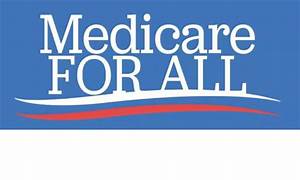
When it comes to healthcare, there’s a lot of talk about Medicare for all. But what does that mean? How can you decide whether this is right for you and your family? Here we examine the pros and cons of Medicare for all, so you can make up your mind.
What is Medicare for All, and what does it mean?
Senator Bernie Sanders heavily promoted it during his 2016 and 2020 campaigns for the Democratic legislative nomination.
How It Works
They get care, but they are also responsible for several fees. But Sanders’ strategy would cover medical bills without a financial burden on the individual. Sanders’s Medicare for All would be a national medical insurance plan that would deal with everybody who lives in the USA. It would cover all medically necessary services, such as vision and dental care, mental health care, and prescription medication. There would not be any co-pays or deductibles except for prescription medication, although the price could be limited to $200 annually. There might also be additional flat-rate prices for long-term maintenance. The authorities would set payment rates for services, drugs, and medical gear. Every calendar year, the Secretary of Health and Human Services would create a federal budget for many covered services, whose national funding would cap spending. Only 1% of their total health spending budget will be allocated to job dislocation assistance for individuals working in the insurance industry. Sanders’ bill comprises a four-year phase-in, through which progressively younger individuals could buy into Medicare. It’d work like this: 55-year-olds could buy into Medicare in the initial year; 45-year-olds the following year; and 35-year-olds from the next season. Out-of-pocket prices would decrease for everybody buying into Medicare. Medicare for All is an efficient single-payer health care system. Single-payer healthcare is the point where the government pays for people’s health care. The modern name makes the idea more popular. A Kaiser Family Foundation survey found that 48 percent of men and women approved single-payer health care, while 62% accepted Medicare for All.
Medicare for All Costs

How much would Medicare for All cost? A single-payer health care system would cost the government a vast amount. If everything remains as it’s currently, we estimate the joint healthcare spending by public and private sectors to reach $45 trillion by 2026.
Sanders has proposed redirecting current government spending of about $2 trillion each year to Medicare for All to cover the application. He also suggested that wealth taxation only affects the top 0.1 percent of families.
Medicare for All will be paid for by:
Companies pay a 7.5 percent income-based premium.
Families pay a 4% income-based premium.
Earned revenue tax rate.
The Affordable Care Act would be replaced by Medicare for All, which would provide health care to everyone. Funding for this plan will come from the public, similar to Medicare and Medicaid.
Medicare for All Pros and Cons
The pros and cons of this plan partly depend on your income bracket. If you earn less than $250,000, then Sanders’ extra tax won’t affect you. If you earn more than $250,000 annually or are in the top 0.1 percent of families, Sanders’ taxation to cover Medicare for All would be a con for you. In any case, universal healthcare demands healthy individuals cover medical care for the ill. But that’s how all health insurance plans function. Everybody buys and pays for health insurance outlays. However, the insurance provider only pays if someone wants medical attention or a policy. In every insurance program, fitter people absorb the expenses incurred by sicker individuals.
Key Benefits
Universal healthcare lowers healthcare costs for the market because it controls drugs and pharmaceutical services through regulation and discussion.
It would also eliminate the administrative expense of working with many personal health insurers. Physicians would need to deal with one government company rather than several private insurance firms, Medicare and Medicaid.
Companies wouldn’t need to employ staff to manage various medical insurance companies’ rules. Instead, billing practices and protection principles are standardized.
Hospitals and physicians could be forced to provide the same level of service at a lower cost, rather than charging wealthy customers for expensive services to make a larger profit.
Universal healthcare contributes to much healthier people. For example, studies demonstrate that preventative care enhances expensive emergency room utilization. Before Obamacare, 46 percent of emergency room patients were there since they had nowhere else to go.
As a result, the emergency room became their primary care doctor. This kind of healthcare inequality is a substantial factor in the increasing cost of health care.
Major Disadvantages
Analysts are worried that insulating individuals from the cost of maintenance will drive up medical care use.
Some analysts are worried that the government may not use its bargaining power to drive down prices as steeply and as quickly as Sanders predicts.
People might not be as cautious about their health if they didn’t have a fiscal incentive.
Authorities need to limit healthcare spending to keep down costs. Doctors may have less incentive to give care if they are not well paid. They can spend less time with each individual to keep down costs. They also have fewer funds for new life-saving technologies.
Considering that the government provides emergency and primary medical care, many universal healthcare methods report wait times for elective procedures. Authorities could also limit services based on a very low likelihood of success and might not cover drugs for uncommon problems.

“US Universal Healthcare”
When most physicians sit staunchly on one side of their line for or against a single-payer health care system, it is worth knowing both viewpoints when choosing a formal position. 27.5 million people in America don’t have medical insurance. America is the only country among the 37 OECD countries with universal healthcare in a clinic or with inherent rights.
The Benefits and Drawbacks of the Universal Health Care System
Proponents of this right to healthcare state that nobody in the wealthiest countries in the world ought to go without healthcare. They claim that a right to health care would cease bankruptcies, enhance health, support small firms, and that health care should be an essential government service.
Opponents argue that the right to healthcare amounts to socialism and that it ought to be an individual’s duty, not the government’s function, to secure healthcare. Furthermore, the government’s healthcare provision will reduce healthcare quality and accessibility and result in vast government deficits and debt.
Resume
So as we move into a new political age, it’s essential that you, as a health practitioner, choose where you feel universal healthcare fits into our system, predicated on these pros and cons and your personal experience. Medicare for All would most likely lower market health costs and improve quality care, while encouraging more preventative maintenance to avoid costly emergency room visits. However, if your annual income exceeds $250,000, or you belong to the top 0.1 percent of families, you may end up paying more. Additionally, few professionals suggest patients will overuse the system when costs are less strenuous.


